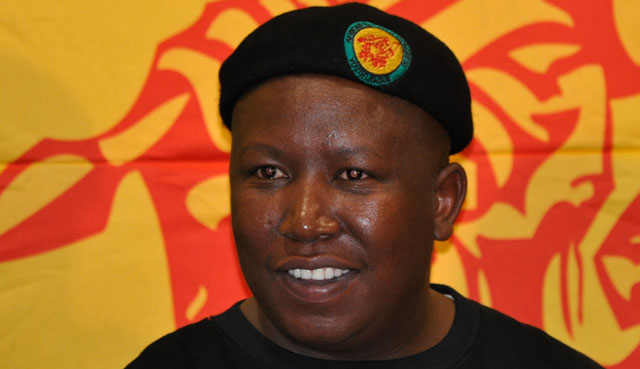
The Economic Freedom Fighters (EFF), led by former ANC Youth League leader Julius Malema, has published its founding manifesto ahead of national elections in 2014 that it is expected it will contest.
The radically left-wing manifesto, which calls for the nationalisation of South Africa’s mines, banks and “other strategic sectors of the economy” without compensation, makes a number of references to the telecommunications industry and the development of broadband infrastructure, arguing this should be led by the state.
“Owing to the character of the South African economy and the aspirations of the people for economic freedom, state ownership and control of strategic sectors of the economy should be the foundation for sustainable economic transformation in South Africa,” the manifesto reads.
“A supposition that the South African economy can be transformed to address the massive unemployment, poverty and inequality crisis without transfer of wealth from those who currently own it to the people as a whole is illusory. The transfer of wealth from the minority should fundamentally focus on the commanding heights of the economy. This should include minerals, metals, banks, energy production and telecommunications, and retain the ownership of central transport and logistics modes such as Transnet, Sasol, Mittal Steel, Eskom, Telkom and all harbours and airports,” it says.
In a section devoted to science and technology, the EFF says it will “advocate for and implement programmes that seek to use science and technology as contributors to sustainable livelihoods”.
“The dissemination of information, education and democratic participation should be enhanced and harnessed through technological developments and capacity.”
The manifesto says the EFF will “advocate for and implement the construction of a ‘High Technological Institute’, which will teach young South Africans innovation and research on technology with the aim of innovating technological instruments and gadgets in South Africa”.
“The industrial policy on science and technology should speak to heavily supporting, promoting and protecting technological innovations that are made in South Africa,” the manifesto adds. “Before these innovations are developed, South Africa should attract technological and electronic-gadget manufacturers to manufacture their goods and services in South Africa in order to transfer skills and expertise.”
Furthermore, it says that government and the private sector should “channel funds to investments in broadband infrastructure in order to increase Internet, radio and television interconnectivity that will enhance access to useful information and data needed for intellectual, social, political and economic development”.
Semi- and fully state-owned enterprises, including Telkom, Broadband Infraco, Sentech and the SABC, should also assist in the development of the African continent. “While avoiding adventurism, these investments should not be driven by the narrow pursuit of profit maximisation, but the need to develop Africa’s infrastructure, logistics, systems and communications in a manner that will transfer skills and create sustainable employment opportunities for many people in the continent, thus contributing to development.”
More broadly, the manifesto says the EFF’s “pillars for economic emancipation” include the expropriation of land without compensation and “massive protected industrial development to create millions of sustainable jobs”.
It says the political movement draws its inspiration from the “broad Marxist-Leninist tradition and Fanonian schools of thought” and offers “cogent alternatives to the current neo-colonial economic system, which in many countries keep the oppressed under colonial domination and subject to imperialist exploitation”. — (c) 2013 NewsCentral Media
- Read the EFF’s full founding manifesto on Politicsweb




